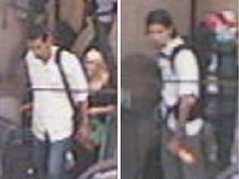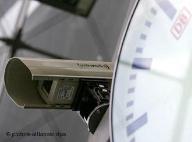Bomb Threat Reignites German Debate on Video Surveillance
Hardly anyone disputes the importance of video surveillance cameras in arresting one of the two railway bombers in the German town of Kiel. But increased reliance on big brother technology is not without its critics.
The use of video surveillance cameras to capture terrorists or crime suspects has been hardly disputed in Britain, where little over a year ago the deadly July 7 bombings led to the arrest of four Islamic radicals.
 In Germany, where one of two suspected suitcase bombers was arrested in the northern city of Kiel on Saturday, there is a greater resistance to closed circuit television (CCTV) for historical reasons. The country's data and privacy protection laws also restrict the use of surveillance technology. But that may be changing now.
In Germany, where one of two suspected suitcase bombers was arrested in the northern city of Kiel on Saturday, there is a greater resistance to closed circuit television (CCTV) for historical reasons. The country's data and privacy protection laws also restrict the use of surveillance technology. But that may be changing now.The homemade bombs were found on two separate trains in the western cities of Koblenz and Dortmund on July 31 but failed to detonate. The second suspect, whose grainy image was also captured by the German railway's film footage, is still at large.
Arrest not possible without cameras
On Monday morning, Deputy Interior Minister August Hanning told German public broadcaster ARD that without video surveillance, the arrest of the 21-year-old Lebanese student in Kiel, who is believed to be connected to a wider Islamic terrorist network, would not have been possible.
Chancellor Angela Merkel also said that video surveillance was an important tool for catching criminals.

"Certainly no one in our nation can claim, that the use of video cameras, which identified one of the perpetrators, is not an important thing," she said at a Berlin press conference on Monday.
The German railways Deutsche Bahn (DB) plans to step up the use of CCTV as part of its overall heightened security measures.
"However, technology is only part of the picture," said Jens Puls, head of the railway's security forces. "We place great value on the alertness and professionalism of our staff on the trains, the stations, and the cleaning and security personnel -- and we plan on adding more personnel on board."
Rail security measures different from airports
Unlike the well established electronic surveillance procedures for screening passengers and baggage at airports, policing the trains and railway stations presents massive challenges.
"We are talking about a whole other dimension when it comes to rail travel," said DB's deputy spokesman, Volker Knauer. "On a daily basis, passengers make five million trips on the railways -- some long distance travel, but largely commuter rides within Germany's borders. We operate 33,000 passenger trains daily. Compare 1.8 billion trips made on our railroad network on an annual basis with only 50 million passenger flights on Lufthansa worldwide in a year. So we don't have the means to screen baggage the same way the airlines do."
Need for alert and experienced personnel
Bernd Carstensen, a spokesman for the German Association of Criminal Investigators (BdK), emphasized the limits of video cameras in preventing crimes and terrorist acts.
"Video surveillance, used retroactively after the act, has been enormously useful," he said. "But what is even more important, is not just what the camera reveals, but experienced security personnel being able to evaluate a potentially dangerous situation on the spot."
Problems of too much reliance on video cameras
But the use of video surveillance also has unintended negative consequences, leading to less crime reporting in general, according to Leon Hempel, a social scientist at Berlin's Technical University, who has done studies on video surveillance.
"The sole focus on a technological fix in fighting terrorism or crime is dangerous," he said. "The unintended consequences of CCTV is that the public feels that the camera is doing the job of recording crime, so why bother to pay attention or report anything suspicious. It leads to a diffusion of civic responsibility."
Sabine Leutheusser-Schnarrenberger, a former federal justice minister and one of Germany's most outspoken critics of trampling civil liberties in the name of national security, was even harsher in her criticism of the potential overuse of video cameras.
"There are cameras in the main railway stations, and they have been used to positive effect," said the parliamentarian, who is a member of Germany's free-market liberal Free Democratic Party (FDP). "The issue cannot be equipping an additional 5,700 regional stations with cameras. The necessary precautions in large measure are already in place. One needs to find the right balance between personal freedoms and security measures, and we have that in Germany."
Diana Fong
Deutsche Welle 08/2006

0 Comments:
Post a Comment
<< Home